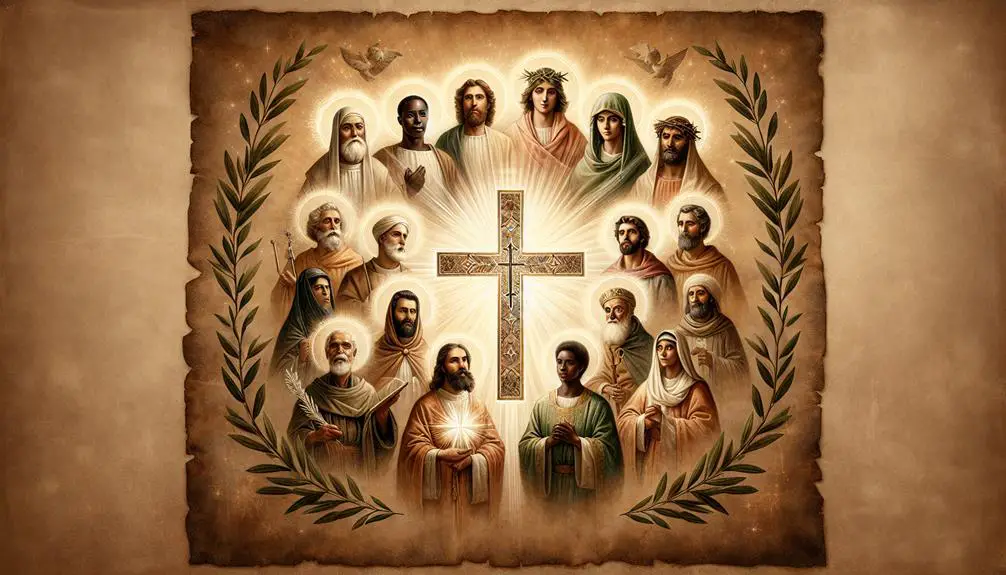Learn how Spanish names from the Bible carry centuries of history and meaning, shaping identities in fascinating ways.

Spanish Names in the Bible
The exploration of Spanish names found in the Bible unveils a rich tapestry of history, culture, and religious significance that spans centuries. From the origins of biblically rooted names to the impact of saints and martyrs on naming conventions in Spanish-speaking countries, this topic offers a fascinating glimpse into how ancient names have evolved and been preserved within modern identities.
As we examine the intersection between biblical narratives and contemporary Spanish naming practices, one can't help but wonder about the stories and meanings behind celebrated and uncommon names alike, inviting further exploration into how these names continue to shape personal and cultural identities today.
Key Takeaways
- Biblical names in Spanish reflect deep cultural and spiritual roots, often linked to significant religious figures and virtues.
- Popular Spanish biblical names like José, María, and Juan have historical and religious significance, maintaining their popularity over centuries.
- The influence of saints and martyrs on Spanish naming practices showcases the enduring legacy of religious and cultural identities.
- The evolution of biblical names in Spanish culture highlights the intersection of historical influences, religious practices, and contemporary identity formation.
The Origins of Biblical Names

The origins of biblical names, deeply rooted in ancient Semitic languages such as Hebrew, Aramaic, and occasionally Greek, reflect a rich tapestry of cultural, religious, and linguistic influences that have shaped their evolution and significance over millennia. These names often encapsulate profound meanings, embodying traits, divine attributes, or hoped-for qualities in the individuals who bear them. The practice of naming, governed by specific naming conventions, was not merely a means of identification but a symbolic act laden with hope, prophecy, or divine favor.
Cultural adaptations have played a pivotal role in the transmission and transformation of biblical names across different epochs and regions. As Christianity spread through the Roman Empire and beyond into the myriad cultures of Europe and the Middle East, biblical names underwent significant linguistic adaptations to fit the phonetic and orthographic norms of various languages. This process of adaptation was not uniform but varied greatly depending on local linguistic contexts, leading to a fascinating diversity in the forms that these names have taken.
For instance, the Hebrew name Yohanan, meaning 'Yahweh is gracious,' evolved into Ioannes in Greek, Iohannes in Latin, eventually becoming Juan in Spanish. This evolution underscores the dynamic interplay between linguistic structures and cultural contexts in shaping the form and usage of biblical names. Each adaptation carries with it traces of the cultural and linguistic journey that the name has undertaken, offering insights into the complex processes of cultural transmission and linguistic change that biblical names have undergone over the centuries.
Popular Male Names and Meanings

ARTICLE TITLE: Spanish Names in the Bible
PREVIOUS SUBTOPIC: 'The Origins of Biblical Names'
CURRENT SUBTOPIC: 'Popular Male Names and Meanings'
Building on the understanding of biblical names' evolution across cultures, this section will explore the meanings behind some of the most popular male names in the biblical context. The adaptation of names from Hebrew and other languages into Spanish has not only preserved their phonetic essence but also their cultural and spiritual significance. This exploration offers insights into how name adaptations have contributed to preserving historical and religious identities across generations.
Spanish Name |
Meaning |
|---|---|
Daniel |
God is my judge |
David |
Beloved |
José |
He will add |
Mateo |
Gift of God |
These names, deeply rooted in biblical narratives, have transcended their original contexts to become integral parts of Spanish-speaking communities worldwide. The name Daniel, for instance, is derived from the Hebrew name Daniyyel, embodying the faith and steadfastness of the prophet Daniel in the face of adversity. Similarly, David, from the Hebrew Dawid, captures the essence of the beloved king whose life stories are central to Jewish, Christian, and Islamic traditions.
José, the Spanish adaptation of Joseph, reflects the story of a dreamer who rose to prominence in Egypt, symbolizing perseverance and divine providence. Mateo, adapted from the Hebrew name Mattityahu, highlights the gift of faith and the spread of divine teachings, as seen in the life of Matthew the Apostle. These name adaptations carry profound cultural significance, embodying virtues and stories that resonate across time and cultures, underscoring the timeless relevance of biblical narratives in shaping personal identities.
Celebrated Female Names From Scripture

The exploration of celebrated female names from scripture reveals a rich tapestry of cultural and spiritual significance rooted in biblical narratives.
The origins of these names, often linked to inspirational women figures, provide insight into their enduring popularity and influence in Spanish-speaking cultures.
This analysis not only underscores the importance of historical and religious contexts but also highlights the profound impact these names and their bearers have had on generations.
Biblical Name Origins
Exploring the origins of celebrated female names from Scripture reveals a rich tapestry of cultural, historical, and religious significance that spans centuries. The analysis of these names uncovers:
- Name Translations: Each name undergoes transformations as it crosses linguistic boundaries, reflecting the phonetic and morphological characteristics of various languages. This process not only preserves the essence but also adapts the name to new cultural contexts.
- Cultural Adaptations: Names are imbued with meanings that resonate with the values, beliefs, and historical narratives of different societies. This adaptation process allows biblical names to maintain relevance across diverse cultures.
- Historical Continuity: The persistent use of these names establishes a link with the past, serving as a testament to their enduring appeal and significance throughout history.
Inspirational Women Figures
Building on the understanding of biblical name origins and their cultural adaptations, this section focuses on the stories of inspirational women figures whose names are celebrated in Scripture, highlighting their impact and legacy. These narratives not only demonstrate women's resilience but also underscore their pivotal leadership roles within their communities.
Name |
Role |
Significance |
|---|---|---|
María (Mary) |
Mother of Jesus |
Emblem of faith and obedience |
Esther |
Queen |
Courage and advocacy for her people |
Rut (Ruth) |
Moabite widow |
Loyalty, love, and the importance of family bonds |
Débora (Deborah) |
Prophetess and judge |
Leadership in delivering Israel, symbolizing strength and wisdom |
Sara (Sarah) |
Wife of Abraham |
Matriarchal figure, symbolizing patience and hope |
These figures exemplify the profound influence of biblical women, illustrating their enduring legacy across cultures and generations.
Uncommon Biblical Names in Spanish

Several uncommon biblical names in Spanish originate from characters whose stories are less frequently highlighted, yet they carry profound meanings and historical significance. The adaptation of these names into Spanish often involves intricate processes of cultural and linguistic translation, reflecting both the sacred origins and the unique phonetic and morphological characteristics of the Spanish language. This adaptation ensures that the names maintain their spiritual essence while becoming an integral part of the Hispanic cultural heritage.
- Name Pronunciation and Cultural Adaptations: The process of adapting biblical names into Spanish often involves modifications to fit Spanish phonology and orthography. For instance, the Hebrew name 'Yehoshua' becomes 'Josué' in Spanish, demonstrating adjustments in pronunciation and spelling to accommodate linguistic norms. This adaptation process not only makes the names more accessible to Spanish speakers but also enriches the cultural tapestry by integrating biblical heritage with Spanish linguistic and cultural nuances.
- Unique Biblical Origins: Many of these uncommon names have origins in lesser-known biblical tales, which are imbued with moral and spiritual lessons. The names thus serve as a bridge to these stories, encouraging deeper exploration of biblical texts.
- Cultural Significance and Identity: Adopting these uncommon biblical names in Spanish-speaking communities can signify a profound connection to religious tradition and cultural identity. It reflects an acknowledgment of the rich tapestry of biblical history and its influence on cultural and personal identity within the Hispanic community.
The Influence of Saints and Martyrs

Beyond the realm of uncommon biblical names, the legacy of saints and martyrs also profoundly shapes the tapestry of Spanish naming conventions, reflecting their enduring influence on religious and cultural identities. The veneration of saints and martyrs, integral to the fabric of Spanish spirituality and heritage, has led to cultural adaptations in naming practices, emblematic of a collective reverence for those who have sacrificed for their faith. This veneration manifests in the frequent choice of names derived from saints and martyrs, not merely as a tribute but as a means of bestowing upon a child a namesake embodying virtues and divine favor.
The process of selecting a name from the pantheon of saints and martyrs often correlates with martyrdom commemorations and feast days, thus embedding religious narratives and the chronicles of martyrdom deeply within the cultural psyche. These commemorations are not only religious markers but also serve as cultural milestones, around which communities gather, stories are retold, and identities are reaffirmed. The names selected in this context are laden with the hopes that the bearers will emulate the commendable qualities of their heavenly patrons.
Furthermore, the cultural adaptations evident in the Spanish context often involve localized versions of saints' names, imbuing them with a distinct linguistic and cultural resonance that further solidifies their place within the community's identity. This practice of adaptation and localization not only preserves the memory of saints and martyrs but also reinforces the interconnectedness of faith, culture, and personal identity in the Spanish-speaking world. Through these naming conventions, the legacy of saints and martyrs continues to influence generations, serving as a bridge between the past and the present, the divine and the mundane.
Naming Trends in Spanish-Speaking Countries

In Spanish-speaking countries, naming trends have been significantly shaped by historical influences and the prevalence of Biblical names.
The incorporation of names from the Bible into the Spanish lexicon reflects a deep interconnection between religious identity and cultural traditions.
This synthesis of historical and religious factors has led to the widespread adoption of certain Biblical names, underscoring their enduring resonance within Spanish-speaking societies.
Historical Influences
The historical influences on naming trends in Spanish-speaking countries are deeply rooted in the region's colonial past, religious traditions, and interaction with indigenous cultures. This intricate interplay has led to a rich tapestry of names that reflect both cultural assimilation and linguistic evolution. Key factors contributing to these trends include:
- Colonial Legacy: European settlers introduced their own naming conventions, which often blended or replaced indigenous names.
- Religious Influence: The Catholic Church played a pivotal role in naming practices, with many names derived from saints and biblical figures.
- Cultural Syncretism: The merging of indigenous and European cultures resulted in unique names that reflect a hybrid cultural identity.
These factors collectively underscore the complexity and diversity of naming practices in Spanish-speaking regions.
Popular Biblical Names
Numerous Spanish-speaking households opt for biblical names, reflecting a longstanding tradition influenced by religious fervor and historical precedence. This trend showcases a deep-rooted cultural inclination towards biblical narratives, underscoring the impact of Christianity on naming conventions across Spanish-speaking regions.
Such conventions are not monolithic; they exhibit significant cultural variations, indicative of the diverse ways in which biblical texts have been interpreted and integrated into the fabric of daily life. Names like José (Joseph), María (Mary), and Juan (John) demonstrate the pervasive influence of biblical figures, while variations and diminutives of these names point to a complex interplay between religious tradition, linguistic innovation, and cultural identity.
This adherence to biblical names underscores a collective reverence for religious heritage, shaped by centuries of faith and cultural exchange.
Biblical Names and Modern Identity

Biblical names, when adopted into modern contexts, often carry with them a rich tapestry of historical and cultural significance that intertwines with contemporary identity formation. This intersection between ancient heritage and present-day realities manifests in several nuanced ways, particularly when observed through the lens of cultural adaptation and name pronunciation within the Spanish-speaking world. The process of integrating biblical names into Spanish culture exemplifies a fascinating journey of transformation, where original Hebrew and Greek names undergo linguistic and cultural modification to fit the phonetic and semantic preferences of Spanish speakers.
The implications of this adaptation are profound, influencing not only how names are pronounced but also how they are perceived within society. This phenomenon can be detailed through the following points:
- Cultural Adaptation: The transition of biblical names into Spanish involves a careful process of cultural adaptation, where names are not merely translated but are transformed to resonate with Spanish linguistic and cultural norms. This adaptation often reflects deeper societal values and collective identity.
- Name Pronunciation: Pronunciation plays a pivotal role in the integration of biblical names into Spanish culture. The Spanish pronunciation of biblical names can differ significantly from their original forms, leading to unique versions that become embedded within Spanish-speaking communities.
- Identity Formation: Adopting and adapting biblical names in Spanish-speaking contexts contribute to the formation of individual and collective identities. These names carry with them narratives of faith, resilience, and heritage, influencing how individuals perceive themselves and are perceived by others within their communities.
The interplay between biblical names and modern identity in Spanish culture underscores the dynamic nature of linguistic and cultural evolution, highlighting how ancient traditions continue to shape contemporary social constructs.
Frequently Asked Questions
How Do Biblical Names Differ in Pronunciation and Spelling Across Various Spanish-Speaking Regions?
In examining how names differ in pronunciation and spelling across various Spanish-speaking regions, it becomes evident that name variations are significantly influenced by regional accents and linguistic nuances.
These variations manifest in both phonetic alterations and orthographic adjustments, reflecting the diverse linguistic landscapes within the Spanish-speaking world.
This analysis, focusing on the specific context of biblical names, underscores the intricate relationship between language, culture, and regional identity in shaping name adaptation and usage.
Can the Choice of a Biblical Name in Spanish-Speaking Cultures Impact a Child's Personality Perception?
The question at hand explores the intricate relationship between naming psychology and cultural identity. Particularly, it examines how the selection of a name can shape societal perceptions of an individual's personality. Through an analytical lens, this inquiry delves into the nuances of how names, as vessels of cultural and familial heritage, may influence the way a child is perceived and interacts within their community. This underscores the profound impact of nomenclature on personal identity formation.
Are There Any Biblical Names That Have Evolved Into Entirely New Names or Forms Unique to Spanish-Speaking Cultures?
The exploration of name origins, especially within the framework of cultural adaptation significance, reveals that certain biblical names have undergone considerable evolution in Spanish-speaking cultures.
This transformation results in unique variations or entirely new forms distinct from their original Biblical counterparts. Such developments highlight the dynamic nature of linguistic and cultural integration, underlining the profound impact of religious, historical, and social influences on the adaptation and evolution of personal names across generations.
How Do Spanish Translations of the Bible Handle the Adaptation of Names From Hebrew, Aramaic, and Greek Origins?
In addressing the adaptation of biblical names from Hebrew, Aramaic, and Greek into Spanish, scholars encounter name localization challenges and translation consistency issues.
These complexities require a meticulous approach to preserve the original phonetic essence while adapting to Spanish phonology. This process is analytical and requires a deep understanding of linguistic nuances to ensure fidelity and coherence across translations, reflecting a scholarly dedication to maintaining the integrity of these culturally and religiously significant names.
What Role Do Godparents Play in the Selection of a Biblical Name in Spanish-Speaking Baptismal Traditions?
In Spanish-speaking baptismal traditions, godparents play a significant role in the selection of a biblical name, highlighting the intertwining of godparent responsibilities with cultural traditions.
This practice underscores the godparents' active participation in the spiritual development of the child, serving as mentors and guides in religious life.
The choice of a biblical name, therefore, is not merely a formality but a reflection of deep-rooted cultural and religious values, emphasizing the godparents' integral role.
Conclusion
In conclusion, the exploration of Spanish names derived from the Bible reveals a rich tapestry of cultural, religious, and linguistic influences.
These names, ranging from popular to uncommon, reflect a deep-seated tradition of venerating biblical figures and saints.
The analysis underscores the enduring impact of biblical narratives on naming practices in Spanish-speaking countries, illustrating how these names serve as a bridge between ancient texts and modern identity.
Thus, the study of these names offers insightful perspectives on cultural continuity and change.



Sign up